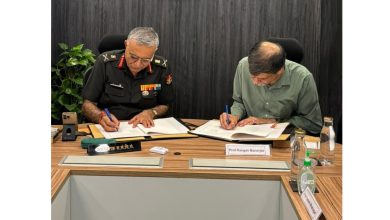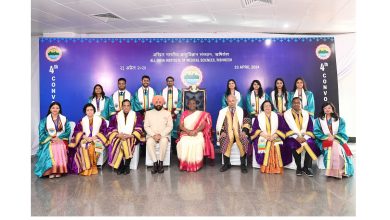Asia-Pacific Leaders’ Conclave on Malaria Elimination stresses need for collaboration across borders

Discussions were held on to leveraging the use of digital tools for eliminating malaria
Dr Mansukh Mandaviya, Union Minister for Health & Family Welfare as recently virtually addressed the Asia Pacific Leaders’ Conclave on Malaria Elimination in presence of Dr Manik Saha, Chief Minister of Tripura, Dr R Lalthamgliana, Minister, Health and Family Welfare Department, Mizoram, Dr VK Paul, Member (Health), NITI Aayog and Dr Poonam Khetrepal, Regional Director, WHO-SEARO.
Dr Culwick Togamana, Minister of Health and Medical Services, Solomon Islands, Dr Antonio Lalabalavu, Minister of Health and Medical Services, Republic of Fiji, Prof Dr Dante Saksoni Harbuwono, Vice Minister of Health, Republic of Indonesia, Dr Zaliha Binti Mustafa, Minister of Health, Malaysia, Dr Mao Tan Eang, Under Secretary of State, Ministry of Health, Kingdom of Cambodia, Dr Champa Aluthweera, Director, Anti Malaria Campaign, Ministry of Health, Sri Lanka, Dr Chuman Lal Das, Director, Epidemiology and Disease Control Division, Ministry of Health, Nepal, Dr Moh Moh Lwin, National Director, Myanmar were also present at the conclave.
According to Dr Mandaviya, malaria is not just a public health issue but also a social, economic and political challenge that requires the cooperation of all stakeholders. India was the only high-burden, high-impact country in South- East Asia region to report a decline in malaria cases in 2020 as compared to 2019. India witnessed 85.1 per cent decline in malaria cases and 83.36 per cent decline in deaths during 2015-2022.”
Addressing the significant challenge posed by malaria, particularly to the marginalised and vulnerable communities, Dr Mandaviya added that “rejuvenated political commitment and strengthened technical leadership will play a monumental role in eradicating malaria from the world.”
Citing the transformational impact of India’s health initiatives such as Ayushman Bharat Pradhan Mantri Jan Arogya Yojana (AB-PMJAY), Ayushman Bharat Health and Wellness Centres, and Ayushman Bharat Digital Mission as well as the substantial role of its healthcare workers, Dr Mandaviya said, “India is committed to sharing our resources, knowledge and learnings with other countries in our endeavour to eliminate malaria.”
Dr VK Paul congratulated South Asian and Pacific Region countries on achieving a significant decline in malaria cases and stressed the goal to make malaria a history with a focus on working on the most marginalised and vulnerable communities with an inter-sectoral approach. He highlighted the need for collaboration across borders while embracing the whole-of-government and the whole-of-society approach.
“We can’t eliminate malaria till we work together across borders. We need to prioritise research and innovation and encourage behavioural change research. We need to work tremendously in developing a vaccine against malaria to have additional arms against malaria.”
Advocating leveraging the use of digital tools for eliminating malaria, Dr Paul stated, “We need to focus on high-burden areas and eliminate this disease with the inter-sectoral collaboration which starts at village level.”
Dr Paul emphasised that urban areas with dense populations, migrant populations, and areas inhabited by tribal populations are some key challenging areas where we need to focus and work together as ‘One Team India’.
Dr Saha alluded to the devastating effects endured by Tripura in 2014 due to an outbreak of malaria. He informed how the State evolved and scaled its practices of vector-control measures, and community awareness via institutional support such as the Indian Council of Medical Research leading to an all-around development of the state and a sharp reduction of cases of malaria.
Dr Lalthamgliana highlighted the role and impact of political commitment stating that these deliberations, and discussions serve to enhance knowledge and awareness in this endeavour, and illuminate further ways and means of achieving higher impact.”
Dr Lalabalavu discussed the practices deployed to eliminate malaria in their country. He said, “There is a need for contingent and persistent efforts as no-size-fits-all and all countries must leverage the available resources to the best of their use, strengthening community engagement and institutional mobilisation.”
Dr Culwick Togamana, Minister of Health and Medical Services, Solomon Islands referred to impediments of financial constraints. He advocated employing a whole-of-government, whole-of-society approach with support from different organisations in the endeavour to eliminate malaria. He further added, “This is an occasion to review our progress, re-affirming our commitments and strategise a plan to eliminate malaria by 2030.”
Reiterating the importance of regional and political commitment to strengthen inter-sectoral commitment with a whole-of-system approach, Rajesh Bhushan emphasised that awareness, detection, diagnosis and treatment need to be taken to the doorstep of the last mile community for successful elimination of the disease.
Dr Khetrapal Singh added “Together, we must invest, innovate and implement, with a focus on reaching the most vulnerable first. Reaching these sections of the population is imperative for achieving the Global Technical Strategy and Sustainable Development Goal targets, and also for delivering on our promise of achieving zero malaria for everyone, everywhere in our region.”
Dr Sarthak Das, CEO, Asia Pacific Leaders Malaria Alliance and senior representatives from various government departments, development partners and corporates were present.
PIB




